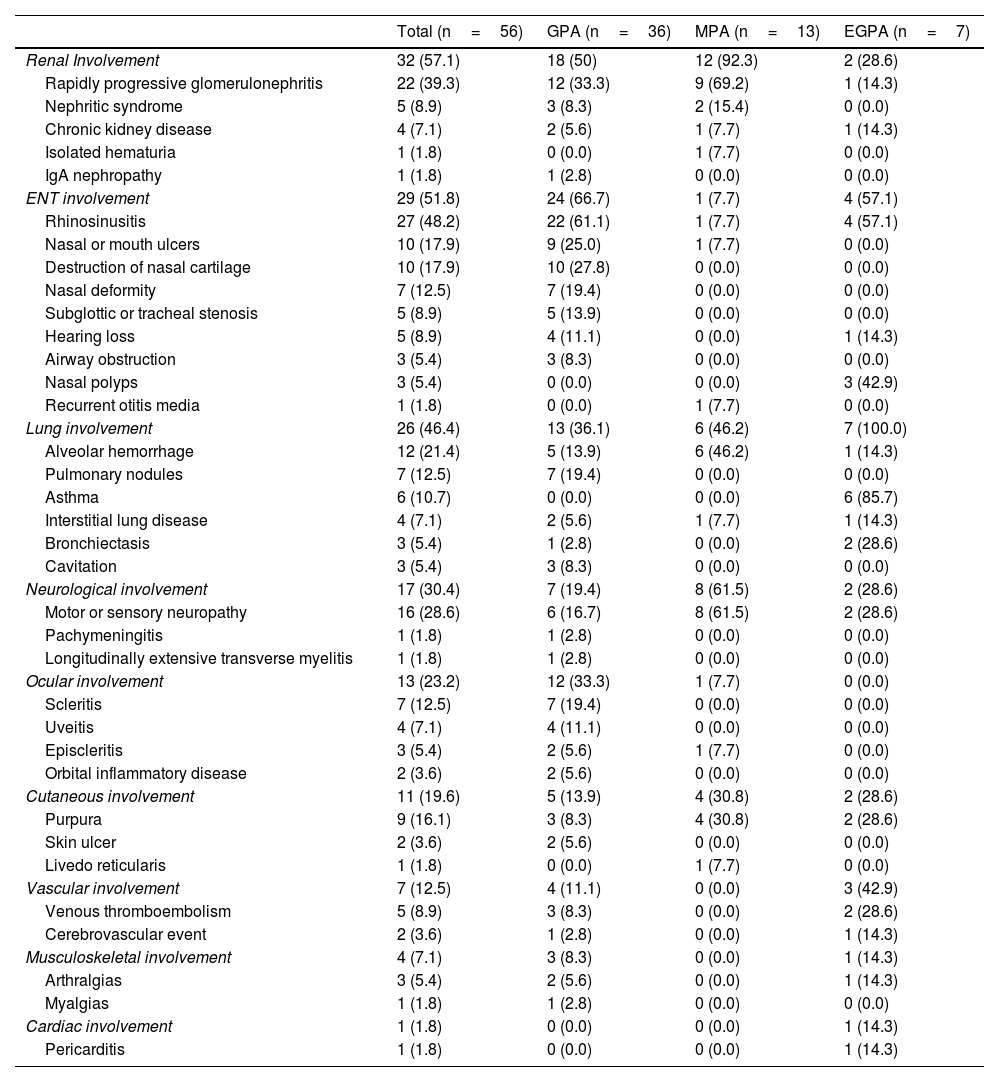Relapses are common in patients with ANCA-associated vasculitis (AAV), which results in a significant burden of morbidity, mortality, impact on quality of life, disability, and cost. However, evidence in the Colombian population is scarce.
ObjectiveThe objective of this study was to estimate the relapse-free survival during the first year and describe clinical and serological variables of patients with AAV in a specialized centre for rheumatic diseases in Colombia.
Materials and methodsA retrospective follow-up study was conducted on a cohort based on medical records of patients over 18 years old with confirmed diagnosis of AAV by the treating rheumatologist and who had achieved remission. Information on AAV relapse and clinical, immunoserological, and treatment-related characteristics was extracted. The relapse-free survival function during the first year was estimated.
ResultsA total of 56 patients were included, 69.9% of whom were women, with a median age of 60 (IQR=48−63). According to the clinical phenotype, 64.3% were classified as granulomatosis with polyangiitis (GPA), 23.2% as microscopic polyangiitis (MPA), and 12.5% as eosinophilic granulomatosis with polyangiitis (EGPA). According to the European Vasculitis Study Group (EUVAS) classification, 39.3% had generalized AAV at debut, 23.2% had localized AAV, 21.4% had severe renal AAV, and 16.1% had systemic AAV. The median Five Factor Score (FFS) was 1 (IQR=0−2). The cumulative relapse-free survival at one year was 82.2%.
ConclusionsThe relapse-free survival observed in this cohort was similar to other reports in clinical studies and AAV registries.
Las recaídas son comunes en pacientes con vasculitis asociadas a ANCA (VAA), lo cual conlleva una carga significativa en morbimortalidad, impacto en calidad de vida, discapacidad y costo. No obstante, se cuenta con poca evidencia en población colombiana.
ObjetivoEl objetivo de este estudio fue estimar la supervivencia libre de recaída durante el primer año en pacientes con VAA en un centro especializado en enfermedades reumatológicas en Colombia y describir las características clínicas y serológicas en esta población.
Materiales y métodosEstudio de seguimiento retrospectivo a una cohorte basado en los registros médicos de pacientes mayores de 18 años con diagnóstico confirmado de VAA por el reumatólogo tratante y que habían alcanzado la remisión. Se extrajo información sobre recaída de VAA y sobre las características clínicas, inmunoserológicas y relacionadas con el tratamiento farmacológico. Se estimó la función de supervivencia libre de recaída durante el primer año.
ResultadosSe incluyeron 56 pacientes, el 69,9% mujeres, con edad mediana de 60 (RIC=48−63). Según el fenotipo clínico, se clasificó el 64,3% como granulomatosis con poliangitis (GPA), el 23,2% como poliangitis microscópica (PAM) y el 12,5% como granulomatosis eosinofílica con poliangitis (GEPA). Según la clasificación del Grupo de Estudio de Vasculitis Europeo (Euvas), el 39,3% debutó con VAA generalizada, el 23,2% con localizada, el 21,4% con renal grave y el 16,1% con sistémica. La mediana de Five Factor Score (FFS) fue de 1 (RIC=0−2). La supervivencia acumulada libre de recaída al año fue del 82,2%.
ConclusionesLa supervivencia libre de recaída observada en esta cohorte fue similar a la reportada en estudios clínicos y registros de VAA.











